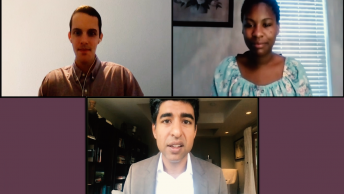By Katie Shea Barrett
My favorite definition of “mother” is: to look after (someone) kindly and protectively, sometimes excessively. I always wanted to be a mother – I just loved looking after people I loved. I mothered my two younger siblings, I mothered my best friends, I even mothered my mother, regularly. When I found out I was pregnant with Ellie, all my dreams had come true.
I found all the information I could to pick the right place of birth, clinical team, and support system; I discussed my friends’ experiences, researched Leapfrog statistics, and learned more about the role of a doula. After deciding on a midwifery model and an in-hospital birth, I looked at the c-section and rooming in rates, breastfeeding and skin-to-skin practices, and other hospital safety and infection indicators, and chose the midwifery practice at Mount Auburn Hospital, a teaching hospital in the city where I lived. We also hired a doula, a woman I met through my yoga community. We knew we were going to have to pay her out of pocket, but decided it would be worth it for both of us to have one more person on our team at the hospital.
Ben, my husband, and I felt confident about all of our decisions and loved our midwife, Leila. She was smart, she talked to us like friends, she explained things clearly, and most importantly, she made us feel in control.
So I was surprised when my family – who are also health care providers – barraged me with questions about the safety of midwives and value of a doula:
Is that a safe decision, Katie? For your first, don’t you want the expert? What if something goes wrong? You are five minutes away from two of the highest ranked hospitals in the country, why would you go there? You know how the systems work, Katie, why would you need a doula too?
As I do, I responded with anger, and with data for uncomplicated pregnancies like mine. Midwives in the United States had lower rates of primary c-sections, their model included spending more time physically with me in labor, and locally, their patient experience results were super high. I’m not sure my family ever fully trusted me, but at least they left me alone at that point. Through that experience, I realized how much more we need to do as a society to trust women’s choices and instincts when it comes to when, where, and how to give birth, if that’s their choice. It sure feels lonely to go into childbirth thinking that your family, your main support system, doesn’t trust what you are doing.
On November 14, 2011, Eleanor Elizabeth Barrett was born. After 42 weeks of pregnancy and two days of labor, my steely and strong midwife who had trained in rural Colorado got a stuck Ellie out as quickly as she could. Through the two-day induction, we tried many interventions to get my girl going – showers, Cervidil, breaking my water, an epidural, and rounds around the labor and delivery unit. I never felt rushed or in danger. My clinical team was extremely patient and helped us feel informed and in charge of each of those options. However, when it came to pushing, I knew that when the nurse got up on a stool, things were not going well. But the midwife, nurse, and doula worked as a team with me and we got Ellie safely out, without any intervention other than their own hands and our collective female strength. The obstetrician, another woman, entered after giving us a few moments as a family because I needed immediate care and whisked Ellie off to the NICU to address some breathing issues.
Ellie was named after two of the strongest women we knew: our grandmothers. Her life is a testament to female strength.

Ben and I are so grateful for that midwife, for our doula who was able to stay with me while Ben went to the NICU with Ellie, and for the seamless integration of the clinical team – the nurse, the midwives, the OB-GYN, the pediatric team. We also loved our postpartum care and the gentle affection and care we received from the postpartum team as we prepared to head home as a family of three.
I share my story because I am a health policy professional, a private insurance card holder, and a white woman with means. My privilege afforded me the ability to make those choices. As founding executive director of March for Moms, it is my work now to ensure that every family has the ability to grow their family in the way that they choose. March for Moms is a non-partisan, solution-oriented 501c3 nonprofit that advocates for the best possible health and well-being of all mothers. We work across a broad coalition of consumer and family, professional, policymaker and industry representatives to align and amplify advocacy strategies and policy goals to ensure that every American family can grow with dignity. I am excited to bring my experience in mothering, in policy, and in delivery system reform together to advocate, like a mother.
Katie Shea Barrett is the founding executive director of March for Moms, a national non-profit that advocates for dignity of care for all growing families through public policy change. She’s a mom of two, a post-partum hemorrhage survivor, and health policy expert. She holds both a BA and a MPH from Columbia University and lives outside Boston with her family.


